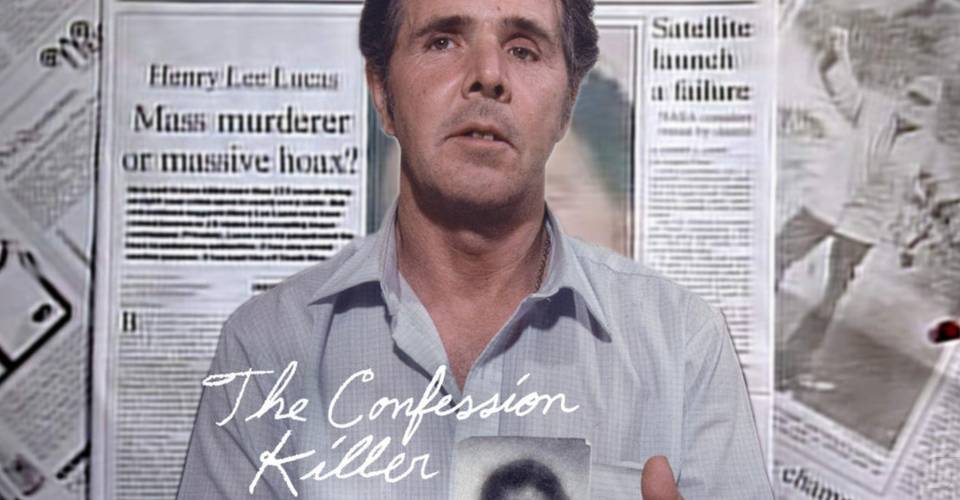- Get link
- X
- Other Apps
Posted by
Scott Martin
- Get link
- X
- Other Apps
Amongst the list of the most notorious serial killers in history stands a redacted name that is both a black eye for law enforcement as well as a reminder how we as humans can desire to believe the sensational. Henry Lee Lucas, arrested in 1983 for a weapons charge, Lucas confessed to the murders of his fifteen year old girlfriend and 82 year old Kate Rich. After that, Lucas claimed an ever increasing number of victims. In the beginning he claimed around a hundred murders across the United States, a kill count that would claim all of the way up to six hundred.
This should have been a massive red flag that perhaps something wasn't quite right. However, this was a time in our culture where the idea of serial killers and what they did fascinated not just the public, but law enforcement as well. The Confession Killer, released by Netflix and directed by Robert Kenner and Taki Oldham, follows the story and the people involved.
The interesting thing about a lot of true crime content is that it sensationalizes the misdeeds to grip an audience. With The Confession Killer, it is doing the exact opposite. This docuseries is not about leaning into horrible crimes to hold an audience, but to actually go the other direction. It is about the willingness of all of us to want to believe something, even if it doesn't make sense.
Ted Bundy, The Son of Sam, John Wayne Gacy, and The Manson Family had been massive news stories. The concept of serial killers was new and captivating, and even the term 'serial killer' hadn't been around for ten years before Lucas was caught. For law enforcement involved, being the people to have caught someone whose claims made every other killer look like teddy bears, this was a massive get. Police from all across the States arrived to talk to Lucas about unsolved murders, which he always confessed to.
The docuseries talks to a wide variety of people. Texas Rangers, police detectives, journalists, and family of supposed victims are among the wide ranging interviews in The Confession Killer. The series is five episodes long, with the segments between forty five and fifty minutes. That's a lot of run time, but this is also a lot of material to cover.
From the perspective of a viewer, the content is very fascinating. As the series rolls on, we start to see the confessions of Henry Lee Lucas unravel while some members of law enforcement refuse to accept that he is falsely confessing. There is even an audio clip where Henry is saying that he can't do this anymore, that he is confessing to murders he didn't commit. The sheriff in the room with him encourages for Henry to continue. I don't believe he was being malicious in guiding Henry, he just didn't want to believe what Henry was saying.
This aspect is a large part of the docuseries. How Henry was handled seems to have encouraged his spree of confessions. He was given smokes, milkshakes, good meals all in exchange for cooperating with the police. He was provided details of the murders to 'refresh' his memory, making it easy to claim responsibility for the crimes. The series also highlights a major issue in policing, where some people in law enforcement refuse to look bad.
In the face of evidence that clearly shows Henry couldn't be the culprit in many of the murders (from DNA evidence to documentation showing he was on the other side of the country on the day of the murder), some refused to accept the truth. Doing so would be admitting that they had failed in their investigations. One interviewee, retired Texas Ranger Bob Prince, shines a massive spotlight on this. Decades later, he both refuses to believe reality and makes it known that people who criticize law enforcement are not good individuals. Unwittingly, he is the exact evidence of the problem that allowed all of these false confessions to take place.
Nobody likes to look bad, but going all out ostrich and sticking your head in the sand just to escape criticism is a bad look. There are people in The Confession Killer who admit they made mistakes, that they they wanted to believe something that turned out to be a fabrication. We are all human, and we all have moments where we realize we drank the Kool-Aid. The Confession Killer highlights this, as well as showing how important it is to admit when we were wrong.
Rating - 3.5 out of 4 stars
- Get link
- X
- Other Apps
I'm smarter than a bat. I know this because I caught the little jerk bat that got in my apartment, before immediately and inadvertently bringing him back in. So maybe I'm not smarter than a bat.

Comments
Post a Comment